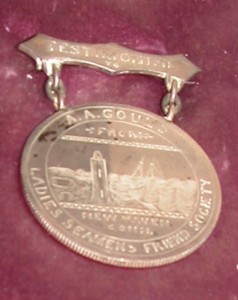When a ship suffers disaster far away from the nearest Coast Guard Base, the Coast Guard puts out a call to other civilian and naval ships in the distressed vessels area to come to their aid. This age old tradition of assisting your fellow mariners in need often goes unheeded. The Ladies Seamen’s Friend Society ensured that recognition went to these civilian rescuers, as evidenced by this silver medal given to Albert A. Gould of Lincolnville for his assistance in the rescue of the schooner JANE’s crew.
The schooner JANE of Bangor, ME dragged onto the rocks at the entrance to New Haven Harbor, Connecticut and sank at 2 am on February 28, 1884 during a furious gale. The thermometer only registered 6 degrees above zero. News of the wreck reached New Haven at 8 am and numerous rescue attempts were enacted. The tug WILLIAM narrowly escaped swamping in the heavy seas in the first rescue attempt. The captain of the WILLIAM joined the tug FREDERICK C. IVES crew. Nearing the wreck, the tug’s yawl attempted to reach the schooner, but was too frail and small for such work. The tug could not approach any closer without wrecking on the reef itself. Heading back for the harbor, they borrowed the yawl of the schooner ROBERT MORGAN, as well as two of the MORGAN’s crew. Four volunteers in the yawl were able to rescue the JANE’s captain and two of her crew by passing several times over the wreck between her masts, rather than tying off and risking swamping the yawl. The JANE’s crew had lashed themselves into the rigging, and had to time their descent down the icy shrouds of the schooner and into the yawl. The fourth crewmember, Elsen, was too benumbed with cold to descend the rigging and it was impossible for the volunteers to rescue him as they became frostbitten and the yawl iced up. They promised to return speedily and took the three crewmembers ashore. The tug returned to port and borrowed the yawl of the schooner EMMA F. ANGELL and eight volunteers, including Capt. Albert A. Gould of Lincolnville, who proceeded out into the gale, which still howled with unabated fury, and struggled for an hour to return to the wreck but, succumbing to frostbite, returned to shore to dry out and try again in the afternoon after the storm began to abate. Darkness set in when they reached the wreck, but they found Elsen still alive. In a lull in the wind, a volunteer sprang into the rigging and with much difficulty helped the Elsen down into the yawl. They rowed as quickly as they could back to shore and Elsen was taken to the hospital in New Haven. The howling of the tempest, the dangerous character of the sea and the intense cold were almost enough to deter the stoutest hearts from venturing out, and it was great wonder that no one died.


